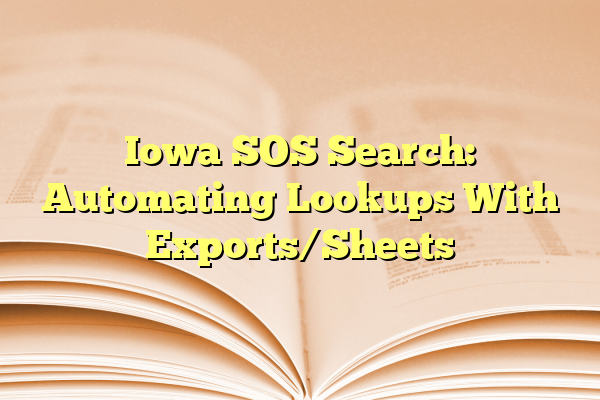
Iowa SOS Search: Automating Lookups With Exports/Sheets
For entrepreneurs, researchers, and professionals operating in the state of Iowa, the Iowa Secretary of State (SOS) Business Entity Search is an essential resource. Whether you’re vetting a potential partner, checking the status of your own business, or conducting market analysis, having quick and easy access to public business records is key. However, using the Iowa SOS search manually for multiple lookups can be time-consuming and repetitive. That’s where automation and integration with spreadsheet tools like Google Sheets or Excel become valuable assets.
Contents
- 1 Understanding the Iowa SOS Business Search Tool
- 2 The Challenges of Manual Lookups
- 3 Leveraging Automation for SOS Lookups
- 4 Sheets Integration: From Web to Spreadsheet
- 5 Use Case: Business Intelligence & Market Research
- 6 Maintaining Data Accuracy & Ethics
- 7 Tips for Getting Started
- 8 Looking Ahead
- 9 Conclusion
Understanding the Iowa SOS Business Search Tool
The Iowa Secretary of State hosts a public business search tool through its official website that allows any user to find detailed information about domestic and foreign business entities registered to operate within the state.
The search tool lets users locate information by entering various parameters such as:
- Business Name
- Business Number
- Registered Agent
- Status (Active, Inactive, Dissolved)
Upon completing a search, the data provided includes critical business details like registration date, registered agent contact information, and business status. This information is not only useful for legal and logistic purposes, but also for conducting market research or identifying leads.
The Challenges of Manual Lookups
Manual use of the Iowa SOS search interface is intuitive and adequate for single or occasional searches. However, for professionals who need to perform high-volume lookups or track changes regularly, the platform becomes restrictive.
Some common challenges include:
- Repetitive entry of business names for multiple lookups
- Inability to bulk export data within the interface
- No native support for data syncing or alerts on changes
So the question arises: How can we streamline this process?

Leveraging Automation for SOS Lookups
Automation plays a pivotal role in minimizing manual effort and maximizing accuracy. There are various approaches to automating data extraction from the Iowa SOS Business Search tool.
1. Web Scraping
Web scraping involves writing scripts using languages like Python (with libraries such as BeautifulSoup or Selenium) to programmatically mimic the behavior of a user browsing and extracting business data.
Advantages:
- Can retrieve large amounts of data in a single session
- Can be scheduled to run periodically for updated information
Limitations:
- Legal and ethical considerations regarding website scraping
- The structure of websites can change, which may break your script
2. Using Third-Party APIs
There are services and APIs that aggregate business registration data at the state level. Although Iowa’s own SOS site may not yet offer a public API, third-party data providers sometimes have mirrored datasets from official sources, available through subscription models.
3. Custom Browser Extensions or Macros
For lower-effort automation, tools like browser extensions (e.g., iMacros, Selenium IDE) or recording macros can capture sequences of actions and repeat them, useful for small batch exports.
Sheets Integration: From Web to Spreadsheet
Once business data is retrieved—manually or automatically—the next objective is organizing it into a usable format. This is where spreadsheet tools like Google Sheets or Microsoft Excel come into play.
Why Export to Sheets?
- Ease of Use: Anyone can review and analyze spreadsheet data—even without programming knowledge.
- Filtering & Sorting: Quickly filter by business status, agent, or registration date to identify trends or red flags.
- Data Sharing: Spreadsheets are ideal collaborative tools when working in teams.
How to Automate Sheet Updates
Once you have automation scripts or data sources feeding data into structured formats like CSV or JSON, you can automate those inputs into Sheets via:
- Google Apps Script: Write or trigger functions to fetch and populate data at intervals.
- Import Functions: Use Google Sheets’
=IMPORTDATA()or=IMPORTXML()functions to fetch online sources. - Third-Party Sync Tools: Platforms like Zapier or Integromat can bridge APIs with Sheets.

Use Case: Business Intelligence & Market Research
Imagine your business development team wants to identify every LLC registered in Iowa within the last 12 months. Manually retrieving this data would take hours. However, with a scraping script connected to a Google Sheet that updates daily, you’re always working with up-to-date results—sorted, filtered, and ready to act upon.
Another example is law firms conducting due diligence on possible clients. Rather than checking each entity manually, a lawyer could be notified by a Google Sheet if a company’s status changes from “Active” to “Dissolved.”
Maintaining Data Accuracy & Ethics
While automation is powerful, it comes with responsibilities:
- Stay Within Usage Limits: Do not overload the Iowa SOS servers with rapid-fire requests.
- Respect Data Compliance Laws: Make sure you’re not violating privacy agreements or misusing public data.
- Audit Regularly: Automated systems can still fail—ensure logs are maintained and reviewed.
Tips for Getting Started
If you’re interested in automating Iowa SOS business lookups and integrating them with spreadsheet tools, here’s how to get started:
- Familiarize yourself with how the Iowa SOS business search results are structured on the website.
- Choose your method of automation: scraping, API, or macro-based.
- Build a simple prototype that extracts business names and imports them into a Google Sheet.
- Use spreadsheet functions or scripts to clean, sort, and analyze the data.
- Scale gradually—add more functionality like change detection or scheduled reporting.
Looking Ahead
As open data initiatives become more prevalent, we may soon see official APIs for business registrations in Iowa and other states. Until then, thoughtful and responsible automation provides an efficient way to track, analyze, and visualize valuable public information.
Automating SOS searches and syncing them with Sheets isn’t just about saving time—it opens up countless possibilities for innovation. From business intelligence and CRM integration to compliance tracking and lead generation, the power lies in bridging governmental data with modern workflows.
Conclusion
Automating the Iowa SOS Business Entity Search and funneling the data directly into spreadsheets can transform the way professionals and businesses handle regulatory and market data. With a mix of creativity, technical know-how, and a focus on ethical data usage, anyone can convert a once-tedious manual task into a streamlined, powerful resource.
The future of administrative efficiency lies in making data mobile, dynamic, and intelligent. And Iowa’s public databases are fertile ground for those ready to take that leap.

